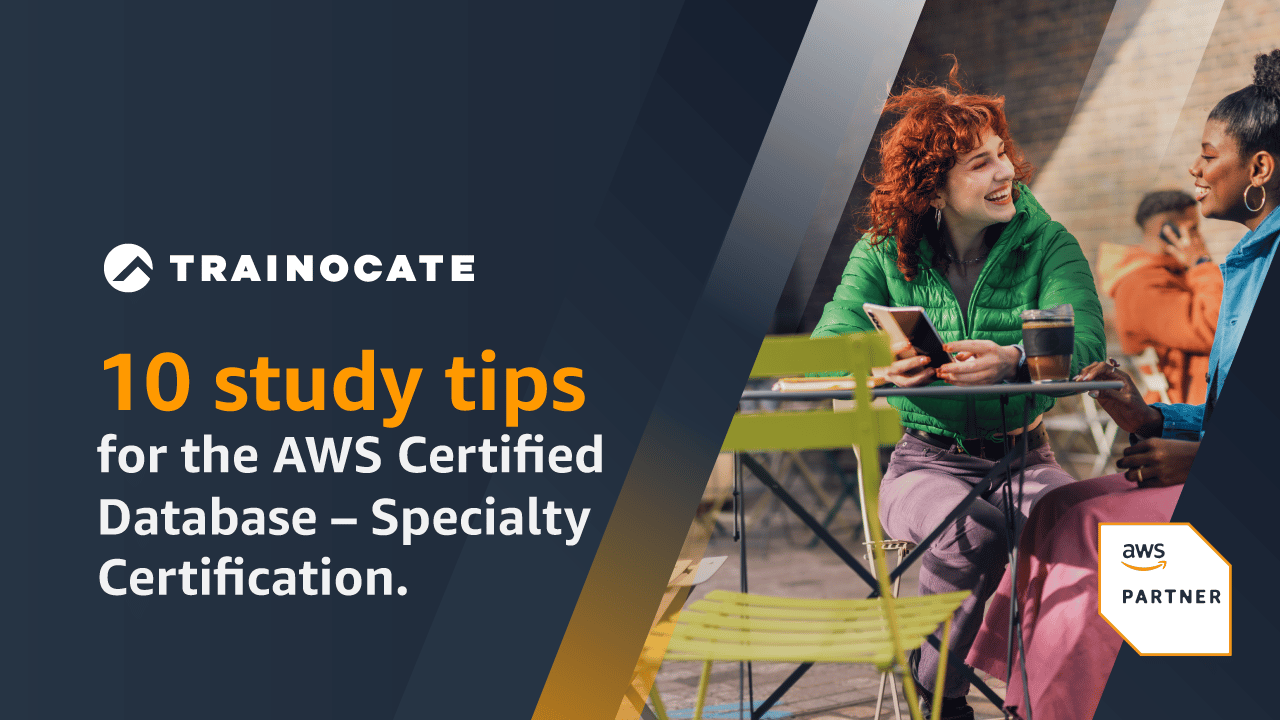10 study tips for the AWS Certified Database – Specialty Certification in 2024
10 study tips for the AWS Certified Database – Specialty Certification in 2024
Become in cloud expert in 2024 – get AWS certified today!
Are you an IT professional eager to advance in the exciting world of cloud computing? AWS training and certifications offers the perfect launchpad for your career.
AWS provides diverse training options tailored to your learning style and objectives. Immerse yourself in hands-on courses designed to transform you into a cloud solutions expert.
But AWS certification is more than just knowledge – it’s your key to career distinction! Certifications demonstrate your commitment to professional growth and validate your ability to design and deploy exceptional cloud solutions.
Why is AWS certification absolutely worth it?
- Master Cutting-Edge Technologies: Stay ahead of the curve with the latest cloud innovations
- Showcase Your Dedication: Earn certifications that reflect your drive and ambition
- Unlock New Career Paths: Become a sought-after professional as AWS skills continue to be in high demand
- Validate Your Database Expertise: Specialize and gain recognition with the AWS Certified Database – Specialty certification
Accelerate your AWS journey with Trainocate Malaysia – AWS Training Partner of the Year 2023. Build your skills through our free digital courses, engaging classroom training, and specialized database learning path.
Master the AWS Certified Database – Specialty exam with these 10 essential tips:
1. Understand which workloads are best suited to each of the purpose-built database services on AWS
When choosing a database solution for an architecture, one must consider the nature of the data and match it with service features which best meet its needs. AWS offers various services that vary in performance, scalability, availability characteristics – creating an opportunity to customize solutions based on workloads. Exam questions heavily focus on this area as 26% is devoted exclusively to designing databases according to specific criteria.
2. Understand strategies for disaster recovery and high availability
To ensure that critical databases always remain available, being familiar with the techniques used to configure AWS database architectures is essential. Not only will this knowledge come in handy on exams, but it also plays an important role when implementing high-availability and disaster-recovery configurations for various services based on Reliability Pillar of the Well-Architected Framework.
3. Understand how database solution deployments can be automated
AWS CloudFormation is an efficient tool that allows you to manage your infrastructure as code and automate the application delivery process. As databases are critical elements within any architecture, using this configuration system makes it easy to build new resources while also managing them throughout their lifecycle- a powerful combination for boosting DevOps practices by unifying developers with operations in one collaborative effort.
How it works?
AWS CloudFormation lets you model, provision, and manage AWS and third-party resources by treating infrastructure as code.
4. Determine data preparation and migration strategies
To ace this exam, it’s vital to have a thorough knowledge of the various data-migration methods available both in and within AWS. Become an expert in techniques like snapshots, database restores and replicating options – as well as which tools best maximize efficiency for your scenario. Don’t forget about ensuring that you’ve got all the required resources prepared beforehand. To make sure everything is on point with converting schemas correctly, use convenient tools such as the renowned AWS Schema Conversion Tool.
5. Determine backup and restore strategies
To keep business data secure and intact, it’s important to have a strategic plan for backups and restores. Depending on which AWS database services are used, the approach will differ; ranging from manual snapshots to automated/continuous backups with varying resource impacts. For certain databases such as Aurora or DynamoDB backup procedures can be implemented without any effect on performance – meaning no interruptions! On the other hand Amazon ElastiCache requires special attention due to engine versioning effects at play that could impact availability & performance if proper mitigating strategies aren’t in place beforehand.
6. Manage the operational environment of a database solution
AWS offers a variety of fully managed databases, where the heavy lifting is done for you! From patching your engine and OS to making configuration changes – AWS has it covered. Depending on which service you choose though, there may be slight variations in how these updates are handled; make sure to read up ahead so that everything goes smoothly.
7. Determine monitoring and alerting strategies
In order to ensure an optimal performance of your AWS databases, you must be adept in using the powerful monitoring and alerting tools available like Amazon CloudWatch, AWS CloudTrail or custom metrics. With these capabilities at hand, surveying server activity is easier than ever!
Amazon CloudWatch
AWS Cloud Trail
8. Understand how you can optimize database performance
Each AWS database service requires and benefits from a unique troubleshooting approach to maximize performance and reduce costs. Take DynamoDB for example – with the right design strategies, like uniform activity across logical partition keys in both tables and indexes, your exam can demonstrate an understanding of how best to achieve optimization.
9. Encrypt data at rest and in transit
Securing data is an essential part of protecting it on AWS. This can be accomplished in varied ways, depending on the service used – from implementing encryption keys managed by Amazon Key Management Service (AWS KMS) to encrypting information during transit with certain database engines. Preparing for certification? Be sure you know how to make use of these features.
10. Determine access control and authentication mechanisms
With a variety of authentication options to choose from, it’s important to familiarize yourself with the database services that support IAM. If you’re setting up configurations requiring native-database credentials, AWS Secrets Manager offers an ideal solution for managing them securely – create your own secrets and integrate them into applications or infrastructure as code without the need for hard-coded passwords.
Who should take this exam?
The AWS Certified Database – Specialty certification is designed to help organizations identify and cultivate database administrator talent with the necessary skills to successfully implement cloud initiatives. By obtaining this certification, individuals can demonstrate their expertise in recommending, designing, and managing effective AWS database solutions.
How does the AWS Certified Database – Specialty certification benefit me as a professional?
- Skills validation – Earning AWS Certified Database – Specialty shows you have expertise in the breadth of AWS database services and how to accelerate the use of database technology to drive business transformation in your organization.
- Confidence – Feel confident selecting and justifying the appropriate database solution. The AWS Certified Database — Specialty certification validates that you meet the bar set by experts in AWS database services.
- Best practices – Showcase your experience delivering value through designing and implementing solutions that improve performance, reduce costs, and enable innovation with the appropriate AWS database services.
- Recognition – With a digital badge that verifies your achievement, AWS Certified Database – Specialty indicates expertise with designing an optimal AWS database solution for any workload.
- Differentiate your skill set – Differentiate your AWS database expertise. With a credential that represents your ability to design an optimal AWS database solution for any workload, you can highlight both breadth and depth in using purpose-built databases to drive effective and efficient business transformation.
Before you take this exam, it is recommended to have the following:
- Five years of experience with common database technologies
- Two years of hands-on experience and expertise working with on-premises and AWS Cloud-based relational and NoSQL databases
- Ability to understand and differentiate the key features of AWS database services
- Ability to analyze needs and requirements to design and recommend appropriate database solutions by using AWS services
| Course Code | Course Title | Fees (RM) | Days | Mar-24 | Jun-24 | Sep-24 |
|---|---|---|---|---|---|---|
| AWS-PDDA | Planning and Designing Databases on AWS | 5,400 | 3 | 13-15 | 12-14 | 4-6 |
Learn how to identify and design the most suitable AWS database solutions with the Planning and Designing Databases on AWS course so you can modernize your data infrastructure with fully managed, purpose-built databases to save time and cost, improve performance and scale, and accelerate innovation. Intended for solutions architects, database architects, and developers, an expert AWS instructor will guide you through the features and characteristics of eleven databases including Amazon Neptune, Amazon RDS, Amazon Dynamo DB, Amazon Redshift, and more, as well as the design considerations that you should make while using them.
Why invest in AWS Training and Certification?
Employees are the most valuable asset for sustained business growth and success.
As the pace of technology innovation increases, the global workforce has failed to keep up, creating a skills gap that prevents employees and organizations from reaching their full potential. Seventy-six percent of IT decision-makers worldwide face critical skills gaps in their departments, increasing 145% since 2016. The great resignation and now the great reshuffle are further impacting organizations’ ability to recruit and retain talent. This makes it vital for customers and partners to build cloud skills from within and a pipeline of future cloud talent they can tap into in order to achieve cloud goals and innovation.
Invest in their data and analytics skills with AWS Training & Certifications, kick-starting your journey to cloud transformation quickly and strategically. Use the free Learning Needs Analysis (LNA) tool to discover gaps within your organization across topics like data science, AI/ML, DevOps etc., then get tailored advice from an expert on how best to bridge those areas of need while staying cost-effective at every step of the way.
Frequently Asked Questions
What is the AWS Certified Database – Specialty Certification?
The AWS Certified Database – Specialty Certification is a credential offered by Amazon Web Services (AWS) that validates a candidate’s knowledge and expertise in AWS database services, database design, migration, troubleshooting, and management.
What are the prerequisites for this certification?
There are no specific prerequisites for taking the AWS Certified Database – Specialty exam. However, AWS recommends having at least 5 years of experience with database technologies and at least 2 years of hands-on experience working with AWS database services.
How can learners prepare for the AWS Certified Database – Specialty exam?
To prepare for the exam, you can:
- Review the exam guide and sample questions provided by AWS
- Explore AWS whitepapers and documentation related to database services
- Take AWS training courses, such as the “Architecting on AWS” and “Data Warehousing on AWS” courses
- Practice using AWS database services through hands-on experience
- Use online forums and communities to share knowledge and discuss topics with other professionals
Is the AWS Certified Database – Specialty certification worth my time?
This certification is definitely worth your time especially for IT professionals and organizations looking to leverage the capabilities of cloud-based databases and here’s a few reasons:
Growing adoption of cloud services: As more organizations migrate their databases and applications to the cloud, there is an increasing demand for professionals skilled in AWS database services. By learning AWS databases, you can stay ahead in the job market and increase your career opportunities.
Scalability and flexibility: AWS databases offer scalability and flexibility, allowing organizations to handle large volumes of data, adjust capacity as needed, and reduce operational overhead. Understanding how to design, implement, and manage AWS databases can help you provide optimized solutions for different use cases.
Cost-effectiveness: By leveraging AWS database services, organizations can significantly reduce their infrastructure and operational costs. As a professional skilled in AWS databases, you can help businesses save resources and improve their return on investment.








